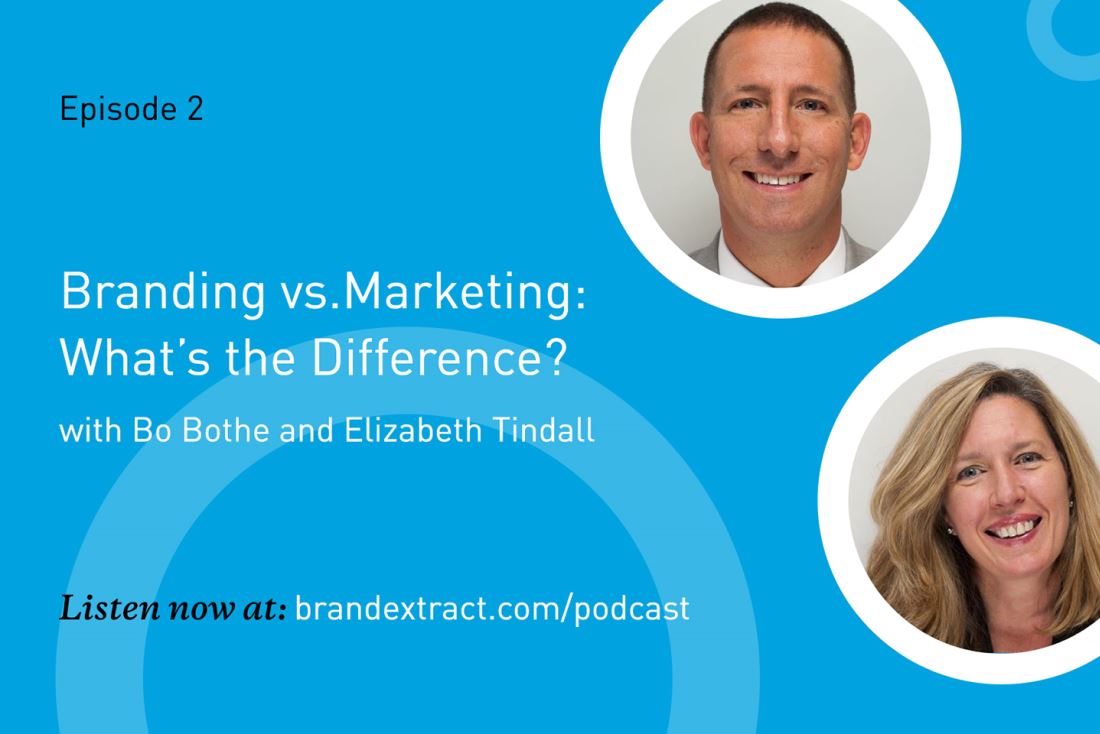Podcast
Branding vs. Marketing: What's the Difference?

Branding vs. Marketing: What's the Difference?
Because of today’s quickly evolving technology, there is a lot of confusion between branding and marketing. In this episode of the Solving for B° podcast, BrandExtract President and CEO, Bo Bothe, Brand Strategist, Elizabeth Tindall, and Director, Marketing Communications, Laura Puente dive into the difference between branding and marketing and discuss why your marketing can evolve with industry trends while your brand remains the same.
Read the Transcript
*This transcript has been edited and formatted for readability.
The Difference Between Branding and Marketing
Laura: Hello and welcoming to the "Solving for B°" podcast. Today we're talking about the differences between branding and marketing. We have Bo Bothe, President and CEO, and Elizabeth Tindall our Brand Strategist. I'm Laura Puente, director of marketing communications.
We thought this was an important topic to talk about because there's a lot of confusion between branding and marketing. But can you talk a little bit about why that is?
Bo: Branding is more focused on how someone feels about a product or service, or how we get them to engage with that product. Marketing is a little bit more about how we're telling people why it matters to them.
Elizabeth: Yeah. Branding is at the essence of who you are as a company. It's all about how you behave, the experience you provide to customers. Whereas marketing is much more about how you promote yourself through different tactics, vehicles and channels to promote and encourage a sale. Branding is more about creating loyal advocates for your company.
Bo: Right. The goal of branding is to get more people to buy more stuff at higher prices for longer periods of time. But marketing drives the behavior that makes that happen.
Laura: Who do you think has the most confusion around branding versus marketing? Is it actual branding professionals and marketing professionals, or is it more about the general public?
Bo: That's a great question. Technology has really confused it. It was one thing when you made a brand, a logo, a trademark, and you tried to embody the passion or the personality of the company in the things that you did. And marketing was pretty simple, right?
Somebody would then take those things and make things to promote you. Then advertising would try and disrupt you to get you to move on. The problem you have today is technology has made it so easy for someone to do all of those things at one time, or at least address a lot of those things faster or easier. So it's made it even harder today to separate the two.
Laura: Like the more touch points you could have with a brand, the more muddled it could get.
Bo: I think that's a great point. Absolutely. The more touch points and the easier it is for non-experts to be more prolific, that's a big part of this as well.
Elizabeth: And I think even in companies, people just interchange the two terms. They use them in the same sentence around the same thing. It's just a lot of labels without really understanding how they all fit together.
The Right Time for Branding and the Right Time for Marketing
Laura: So is there a right time for branding versus a right time for marketing?
Bo: You have to pay attention to them both all the time. If you start to talk about rebrands, there are certain events that will drive an organization to address changes in their market, or changes in the way they present their product to the market, that will then precipitate a rebrand or a branding activity.
The same thing can happen from a marketing standpoint, where marketing is going on and, all of a sudden, people are starting to see a difference in behavior and change.
That's great with the technology we have, from a marketing standpoint. It can start to tell you when to address branding issues if somebody thinks you're fast or slow and so on.
How does that align with the type of company you want to be? It's always ongoing. There are certain things that precipitate branding.
Elizabeth: Branding needs to be thought, at first, as who you are before you can really start to express that through campaigns to drive engagement. So I think branding is core to the marketing strategy at the get-go.
Laura: And even after you've established the brand and established the marketing strategy, the brand is what you're always coming back to for re-evaluation.
Elizabeth: Exactly. Because the brand is set and true to who you are unless something happens in the marketplace. Whether your company has changed fundamentally, you're adjusting to new competitive pressures or maybe you're entering a new market -- your brand doesn't change as often as perhaps your marketing campaigns would.
Good Examples of Branding and Marketing
Laura: So what are some good examples of good branding, and then what are some good examples of marketing campaigns or companies who are doing a good job marketing? Just so we can put some concreteness to our discussion.
Elizabeth: Last year Business Insider put out the 10 Most Powerful Brands, with Walt Disney being the number one. Others in that realm were Nike. Apple is one.
Bo: The ones that are the strongest are the ones that are more consistent. But I think Apple is a little lost right now. The interface isn't as usable as it was before. I have to hold my thumb over something longer than it really feels like it should be there. That was why people bought into Apple – because they wouldn't release a product unless it was perfect.
I was always willing to pay a premium for that. Now, I'm a little less willing to pay a premium. But in general that brand has been pretty consistent. Much like Coca-Cola, much like Disney. Disney keeps reinventing itself a little bit, but really it stays true to this magical thing of being in that place that's really a lot of fun, or watching a movie and separating from the world.
Their acquisition of Marvel was a pretty incredible deal because they added a darker element to their brand than they'd had in the past. And they were still able to keep that pretty true and the movies all feel that way.
Defining a Successful Brand
Laura: That's a perfect segue into the next topic. How do you define a successful brand? Because even if your business may not be performing the way that you want it to for different reasons at a given time, that doesn't mean that your brand has necessarily been compromised.
Elizabeth: I think it speaks back to the consistency aspect. Have you consistently lived up to who you've defined you are? Your mission, vision and values support your brand.
Does all of your expression of that brand ring true to that core essence? Is it at every interaction a customer may have with your company? Whether it's how you answer the phone or how you behave during a sale. What's the follow up like? And have you created that advocacy and engagement, and created those loyal customers for the long term?
Bo: Elizabeth and I talk a lot about this, where truth is a big part. You have to be true in your message and who you are. That's the marketing component, right? But the branding piece is – is it really who you are?
I'm trying to think of a good example here where you walk into a store and know they've promised you one thing online, or they've promised you one thing in their TV commercials. You walk in, and some five-year-old is trying to sell you jeans that don't fit and they're not comfortable for you. But man, they're pushing them and they're pushing them. And you're like, “This doesn't fit me.” That kind of truth or honesty always comes back to who you are as an organization.
And that rings true. People can feel it, they may not be able to put their finger on it, but they can feel it when it's not honest or true. And then consistency builds on that, with what Elizabeth was talking about.
If you're always that way, it can get a little boring every once in a while, but that's one of the challenges that companies face. They get bored with it, but their customers are not. The customer doesn't interact enough to get bored with your consistency. You may be bored, but the customer is not.
Laura: And Bo, I know you've talked a lot about promises kept, so that can be another measure.
Bo: Absolutely. I think Southwest Airlines does the best job of that, for me. They are who they are and they sing on the airplane and their pilots are friendly and everybody's really nice. And it's not the most comfortable ride, but they don't promise that.
They promise me price. They promise not to cheat me out of things. They promise not to hit me with costs everywhere and they make it pretty easy to do business with them.
So when you look at their advertising over time, when you look at the type of people that you interact with within the airline, who they hire, how they express themselves. Elizabeth was talking about how they answer the phone. All those things add up to brand loyalty, which is a big, important piece to that.
Laura: All right, well, any last words before we're back to work?
Bo: Yeah. I think the biggest difference between branding and marketing – Laura, we've all talked about this – are the levels of disruption. You've got advertising that needs to disrupt your day to get your attention. You've got marketing that makes you aware, and then you've got brand which is who you are.
And how those things align and how you stay true to the message all the way through those, I think really impact your ability to grow; your ability to get the profit you're expecting; your ability to deliver on the promises you make. That's why branding, I think to Elizabeth's point about it being first, that's why that's the most important.
Laura: Cool. All right. Thanks, Elizabeth. Thanks, Bo. Back to our regularly scheduled meetings.

